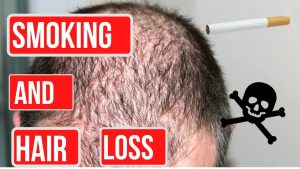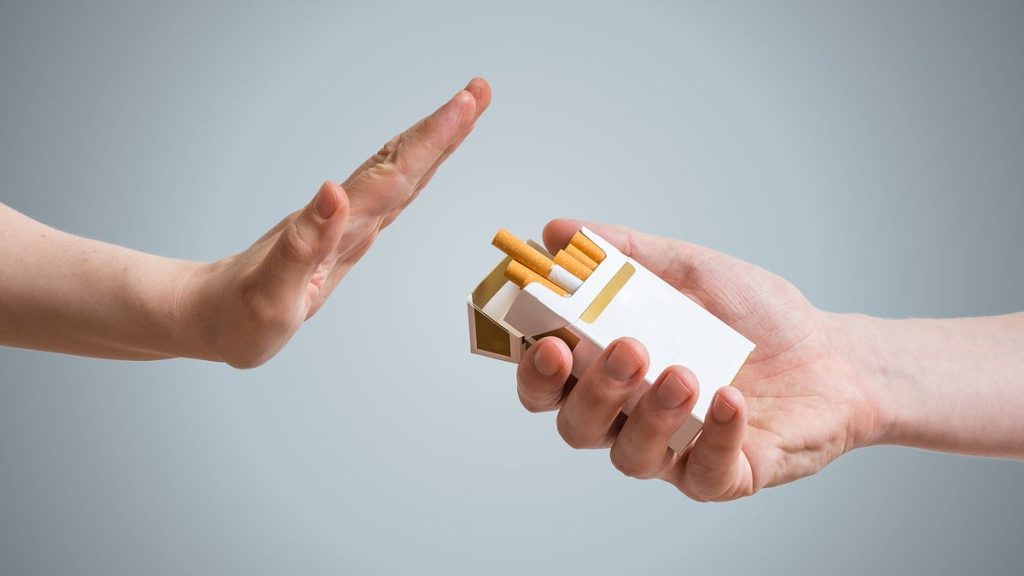Smoking is one of the most preventable causes of death in the world, and yet almost 20% of Americans still smoke. If you’re one of those people, it’s time to quit smoking for good. Here are some tips to help you succeed.
Contents
- 1 Why Do People Smoke?
- 2 Benefits Of Quitting Smoking
- 3 Smoking And Addiction
- 4 What Is Nicotine?
- 5 Dangers Of Smoking
- 6 Dangers Of Second-Hand Smoke
- 7 Can Nicotine Replacement Help?
- 8 How To Quit Smoking?
- 9 Tips For Getting Started
- 10 What To Do When You Relapse?
- 11 How To Stay Motivated?
- 12 Tips For Making It Through Difficult Situations
- 13 Conclusion
- 14 A Word From Therapy Mantra
Why Do People Smoke?

There are a number of reasons why people start smoking, but the main reason is that they’re addicted to nicotine. Nicotine is a drug that’s found in cigarettes and it’s what makes them so addictive.
Some people smoke to relieve unpleasant memories. Smoking can be a way to relieve stress and unpleasant feelings. When you’re stressed, your body releases hormones like adrenaline that can make you feel tense and anxious. Smoking can help to calm these feelings. Nicotine is also a stimulant, so it can briefly make you feel more alert and happy. However, this feeling is only temporary, and it’s usually followed by a feeling of guilt or disappointment.
Benefits Of Quitting Smoking
There are a lot of benefits that come from quitting smoking. Here are some of the biggest ones:
1. Quitting smoking improves your heart health right away and reduces your risk for future problems like heart attack and stroke.
2. Your lungs will start working better almost immediately after you stop smoking, so you’ll be able to breathe easier.
3. Within 20 minutes of quitting smoking, your blood pressure will go down and the amount of carbon monoxide in your blood will drop to normal levels.
4. After a year, your risk for heart disease goes back down to almost normal levels and you’ll be able to live a healthier life overall.
5. Your risk for stroke will drop dramatically and your overall life expectancy will increase.
6. Your teeth and fingernails will stop yellowing and you’ll find that they grow faster after quitting smoking too. The same goes for the hair on your head!
7. Quitting smoking can prevent problems like gum disease and erectile dysfunction, which means you’ll be able to have a healthy sex life even when you’re old.
Smoking And Addiction

People who smoke know that smoking is addicting, but they might not understand exactly why. Smoking cigarettes causes a release of dopamine, which stimulates the pleasure centers in the brain. Over time, smokers begin to need cigarettes to keep this effect going because they develop a tolerance. This is what causes withdrawal symptoms when people try to quit smoking and why it’s so hard to stop smoking for good.
What Is Nicotine?
One of the main chemicals in cigarettes is nicotine, which is an addictive substance that causes smokers to crave a cigarette. While it has a stimulating effect at first, nicotine becomes less satisfying over time and so people smoke more to get the same effects they used to from smoking.
Nicotine also affects other parts of the body. It constricts the blood vessels in your brain and increases your heart rate and blood pressure. These effects can cause dizziness and nausea when you first start smoking, but after a while, your body gets used to them and they go away. Nicotine also causes the production of adrenaline in the body, which is another kind of stimulant that will make you become more alert.
Dangers Of Smoking
Smoking is one of the leading causes of preventable death in the world. It’s responsible for the deaths of more than 480,000 Americans every year. And that’s not even counting the smokers who die from secondhand smoke.
Effects Of Smoking On Your Skin
Tobacco smoke is very damaging to your skin and can cause cancer as well. When people smoke, they’re constantly exposing their skin to this dangerous chemical which causes cells to mutate and become cancerous over time. Skin that’s constantly exposed to tobacco smoke will develop dark spots on the face called “nicotine stains.” Despite their appearance, these stains are not dirt or makeup.
Nicotine is also toxic to the skin of people who don’t smoke cigarettes because of second-hand smoke exposure. It can cause blood vessels to become fragile and break easily. This can result in bruising more easily or even some kinds of skin cancers that form on the surface of the skin.
Smoking Effects On Hair

There are a few ways that smoking can damage your hair and make it look unhealthy. First of all, nicotine is bad for hair follicles. It keeps them from getting adequate nutrition by clogging up the blood vessels in the scalp. This means that smokers have less blood flow to their scalp and therefore less blood flow to their hair follicles.
Since the chemicals in cigarette smoke irritate the scalp, this can cause excess oil production and therefore dandruff or other forms of scalp dermatitis. Smokers also have a higher risk for certain kinds of baldness that occur when the blood vessels on the head don’t get enough oxygen due to clogged arteries.
Smoking And Hair Loss
Many people who smoke cigarettes often wonder if quitting smoking will make their hair fall out. While this is a common side effect of quitting, it isn’t actually caused by nicotine withdrawal. Rather, the chemicals in cigarette smoke cause the body to produce high levels of prostaglandin E2. This chemical causes the hair follicles to shrink and therefore reduces hair growth.
Other Side Effects Of Smoking
Smoking causes many different kinds of problems besides those listed above, including:
- Increased risk for blood clots and cardiovascular disease
- Premature aging: wrinkles and age spots -Bad breath and chronic bad taste in the mouth
- Tooth staining and tooth loss
- Lung scarring and chronic lung infections like pneumonia
- Problems during pregnancy: placental abruption, ectopic pregnancy, stillbirth, low birth weight babies.
Smoking also decreases fertility in both men and women by decreasing sperm count and quality of semen, respectively.
Dangers Of Second-Hand Smoke

Second-hand smoke is the combination of smoke that comes from the burning end of a cigarette and the smoke exhaled by smokers. This type of smoke contains many toxic chemicals, which get onto everything near smokers, including their hair, skin, and clothes. Even if you don’t smoke at all, it’s unhealthy to be near second-hand smoke because the chemicals are easily absorbed through the lungs into the bloodstream.
Can Nicotine Replacement Help?
Many smokers who are trying to quit turn to nicotine replacement therapies like patches, gum, lozenges, nasal spray, or inhaler. These work by providing a dose of nicotine to your body without actually smoking a cigarette. This can decrease cravings for cigarettes and make it easier for you to quit.
However, nicotine replacement therapies do not work for everyone and can cause some people to have a hard time quitting smoking. For example, those who are trying to quit could become dependent on these treatments and then find it harder to quit using them. Thus, you should always talk to your doctor before starting any kind of smoking cessation treatment.
How To Quit Smoking?
There are a number of ways that you can quit smoking. You can try to quit cold turkey, use nicotine replacement therapy (NRT), or use medication to help you quit.
Try Cold Turkey
If you want to try to quit smoking cold turkey, you should make a plan and set a date to quit. You should also make sure that you have support from family and friends. On the day of your quitting, throw out all of your cigarettes and avoid places where you would normally smoke. Replace your cigarettes with healthy activities, like exercise or meditation.
Use Medication
If you want to use NRT, there are a number of different forms that you can try. Nicotine patches slowly release nicotine into your bloodstream, and nicotine gum and lozenges allow nicotine to be absorbed in your mouth. Another form, nicotine inhalers, delivers nicotine directly into the lungs.
Some people choose to quit smoking by using prescription medication like bupropion (Zyban) or varenicline (Chantix). These medications are intended to help reduce cravings for cigarettes and withdrawal symptoms when you quit. Both are available only by prescription.
Keep a craving journal
When you’re trying to quit smoking, it can be helpful to keep a craving journal. In this journal, you can track the times and situations when you experience cravings for cigarettes. You can also track what you do to resist cravings. This can help you identify patterns and find strategies that work best for you.
Avoid Common Triggers

When you’re trying to quit smoking, it’s important to avoid common triggers. Triggers are things that can make you want to smoke. Some common triggers include alcohol, caffeine, stress, and boredom.
Here are some tips for avoiding common triggers:
- Avoid drinking alcohol when you’re trying to quit smoking. Alcohol can weaken your resolve and make it harder to resist cravings.
- Avoid drinking caffeine when you’re trying to quit smoking. Caffeine can increase feelings of anxiety and make it harder to resist cravings.
- Stress can be a major trigger for smokers. When you’re feeling stressed, take a few minutes to relax and de-stress. Try yoga, meditation, or deep breathing.
- When you’re trying to quit smoking, avoid activities that are usually paired with cigarette cravings. This can include drinking coffee or alcohol, having a meal, or talking on the phone.
Tips For Getting Started
If you want to quit smoking, you need to make a plan and stick to it. Here are some tips to help you succeed:
1. Make a list of reasons why you want to quit smoking and keep it on you at all times. Whenever you feel tempted to pick up a cigarette, look at the list and remind yourself why you’re making this change.
2. Tell people around you that you want to quit smoking so they can help support your efforts. This will also increase your chances of success because social pressure is one of the reasons people don’t quit smoking.
3. Avoid situations that trigger your desire to smoke, like bars or parties with friends.
4. Try quitting cold turkey by going the entire day without smoking any cigarettes at all. If you get cravings, try chewing on some sugarless gum or slowly sipping a sugary drink to take your mind off of smoking.
5. Try different techniques to keep your mind off of smoking, like taking deep breaths or speaking very loudly. Don’t let yourself slip into old habits by trying out new ones.
6. Get rid of all the objects you associate with smoking, like ashtrays and lighters, so they’re not visible when you get cravings.
What To Do When You Relapse?

If you do relapse and start smoking again, don’t get discouraged! Everyone relapses when they’re trying to quit smoking. Just pick yourself up and try again with the strategies listed above.
Don’t Be Afraid To Get Help
If none of these strategies work for you and you can’t quit smoking, that doesn’t mean there’s anything wrong with you. It means that you need to get more serious about quitting smoking and seek out medical help.
Smoking is one of the leading causes of preventable death in America. Make a plan and stick to it for 30 days. You can do it!
How To Stay Motivated?
It’s important to stay motivated throughout your quitting process so you can prevent relapse. Here are some strategies that can help you stay motivated:
1. Write a list of the benefits you’ve gotten from quitting smoking and review it often. This will remind you why it’s worth sticking to your plan even when times get tough.
2. Reward yourself every time you meet a milestone in your quitting process, like getting through a week without smoking.
3. Find something to take your mind off of smoking during the times when you would usually smoke and try new activities like going for a jog or doing yoga.
4. Tell yourself that quitting smoking is worth it and remind yourself why you really want to quit in the first place. This will help you get through the tough days when you have lots of cravings.
5. Remind yourself that it’s not too late to quit smoking even if you’ve been smoking for a long time already. The benefits will outweigh the cons soon. You’ll be able to breathe easier, feel better, and live longer.
Tips For Making It Through Difficult Situations

If you’re trying to quit smoking, there will probably be some difficult situations where cravings are especially intense. You can make it through these situations by knowing what to expect and planning ahead.
Here are some tips for making it through difficult situations:
- Commit to avoiding cigarettes, even in tempting situations (like drinking with friends). Try to plan social activities that don’t involve smoking. If you do end up drinking or smoking, then distract yourself from the urge to smoke by talking with someone else.
- Let your friends and family know that you’re trying to quit smoking. Ask them for their support and encouragement.
- Try not to be discouraged if you do end up smoking a cigarette after quitting. This doesn’t mean that you’ve failed, and it doesn’t mean that quitting wasn’t worth it. Instead, view it as a learning experience and try again next time.
- Quitting smoking can be an emotional challenge. Keep in mind that the struggle is temporary, but quitting is permanent. You will get through this difficult time by staying positive and working toward your goal of quitting smoking.
Conclusion
Quitting smoking is hard, but there are many great resources to help you get through the process. You can use a combination of counseling and medication or just the support of other people who are trying to quit. Whatever your method, be sure to know that quitting smoking is an important step for improving your health and saving money. If you are looking for help for quitting smoking, Reach out to us. We are here to help.
A Word From Therapy Mantra
Your mental health — Your psychological, emotional, and social well-being — has an impact on every aspect of your life. Positive mental health essentially allows you to effectively deal with life’s everyday challenges.
At TherapyMantra, we have a team of therapists who provide affordable online therapy to assist you with issues such as depression, anxiety, stress, workplace Issues, addiction, relationship, OCD, LGBTQ, and PTSD. You can book a free therapy or download our free Android or iOS app.


